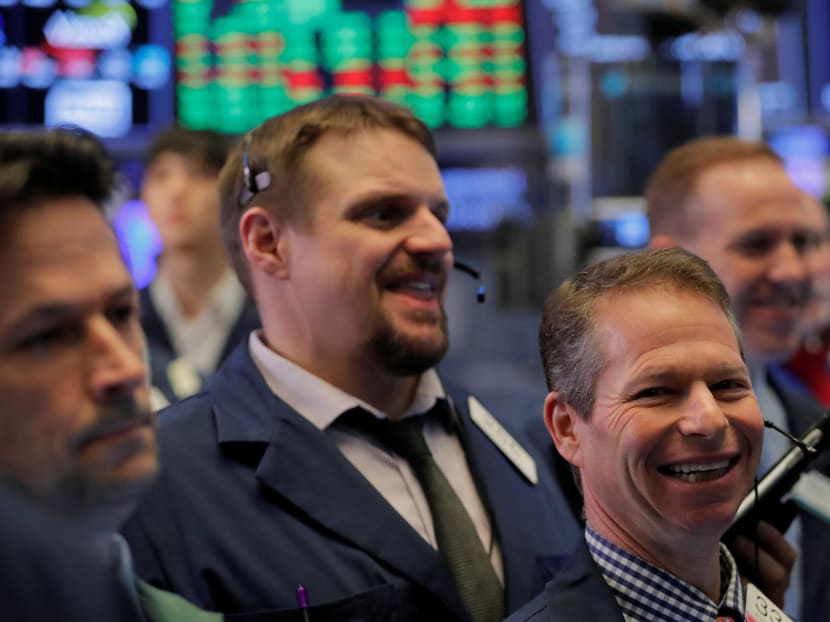Why financial markets like Trump
Since his inauguration a year ago, Donald Trump has made a number of strange decisions. His thinking and approach towards trade and foreign policies have been considered helter-skelter and his brinkmanship with North Korea has raised fears of a nuclear war.

Traders work on the floor of the New York Stock Exchange shortly after the opening bell on Jan 19. The US stock market has risen partly because companies continue to expect that President Donald Trump will adopt pro-business policies. Photo: Reuters
Since his inauguration a year ago, United States President Donald Trump has made a number of strange decisions. His thinking and approach towards trade and foreign policies have been considered helter-skelter and his brinkmanship with North Korea has raised fears of a nuclear war.
His popularity ratings have slumped to record lows.
The stock markets, however, have boomed. Between Jan 20, 2017 and the end of 2017, the Standard and Poor's index gained almost 17.71 per cent, even starting from a relatively high base.
Sceptics dismiss the market gains as irrational, or market exuberance, implying that the gains are without foundation. I beg to differ.
While market prices may be out of sync with fundamental valuations in the short term, market performance is an aggregation of the expectations of thousands of players, many of whom are knowledgeable. Unlike analysts and observers, markets are objective and do not suffer from the biases that most human beings do.
If market valuations are accurate (or at least more accurate than the opinion of any one person), then Mr Trump is doing something that the market and the financial world appreciate.
First, he has promised to invest billions of dollars in improving America’s crumbling infrastructure. Anyone who has driven in the US or had the misfortune to fly through its many decrepit airports will attest to the dire need for investment.
Whether Mr Trump delivers on that promise is another matter, but businesses might be attaching a non-trivial probability that creaking infrastructure will indeed be upgraded.
Second, Mr Trump has just passed a major tax reform. While the impact of some elements of the reform are still being debated, there are several aspects that the corporate world is likely to think highly of.
These include lowering the corporate tax rate and also lowering taxes on bringing home large stashes of corporate profits that are currently being held overseas.
A third and less obvious factor may relate to the way the US legal system has changed, especially during the Obama presidency, and Mr Trump’s pledges to roll back burdensome regulations and prosecutions brought in by his predecessor.
In August 2014 a leading article in The Economist titled “The Criminalisation of American Business” summed up the situation under former president Barack Obama well. It accused US regulators and prosecutors of effectively conducting closed-door trials and extracting billions of dollars in fines by running “the world’s most lucrative shakedown operation”.
“The formula is simple,” The Economist’s leader read.
“Find a large company that may (or may not) have done something wrong; threaten its managers with commercial ruin, preferably with criminal charges; force them to use their shareholders’ money to pay an enormous fine to drop the charges in a secret settlement (so nobody can check the details). Then repeat with another large company.”
The Economist’s leader was published not long after French bank BNP Paribas was hit with a whopping US$9 billion (S$11.9 billion) settlement by US prosecutors (notably without a trial) for violating American sanctions on doing business with Cuba, Iran and Sudan.
BNP was also obliged to plead guilty to criminal charges of conspiracy and falsifying records and had its right to clear certain dollar transactions suspended.
Whilst doing business with agencies accused of human rights violations and other abuses can never be condoned, the case and others likes it raise a raft of questions about the proportionality of penalties and the reasonableness of America imposing its foreign policy via the international financial system and its dominant currency.
Mr Trump has said he wants to ease up on what he sees as his predecessor’s anti-business policies and rein in over-zealous, Obama-appointed US prosecutors who have been blamed for extracting hefty fines – and mileage for their own careers – by pursuing high-profile cases.
He has also promised a general rollback of federal business laws and regulations such as the Dodd-Frank act, which he has labelled “a disaster”.
While Mr Trump’s statements may have been perceived positively, words will need to be followed by actions.
If they are not, the positive sentiment will slump, businesses will scale back their expectations and market valuations will adjust accordingly.
Overall businesses continue to expect that Mr Trump will be friendlier than Mr Obama, who despite much talk about the booming stock markets in his presidency, implemented many policies that were seen as hostile to business.
Mr George W. Buckley, the chairman and president of 3M, summed it up in a 2011 interview with the FT. Speaking of Mr Obama, he told the newspaper: “We know what his instincts are -- they are Robin Hood-esque. He is anti-business.”
With such feelings about the previous administration, it is no surprise that the markets are booming in the first year of the Trump presidency.
Regardless of his character flaws, he is viewed by business as a welcome relief.
ABOUT THE AUTHOR:
Nitin Pangarkar is an Associate Professor in the Department of Strategy & Policy at the National University of Singapore Business School. These are his own views.






